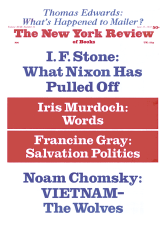In response to:
Three Authors in Search of a Proletariat from the April 6, 1972 issue
To the Editors:
In his review of Touraine’s book The Post-Industrial Society (NYR, April 6), Tom Bottomore writes that his description does not differ widely from formulations by Brzezinski and myself and then goes on to say: “Brzezinski and Bell however conceive it as a society in which major social divisions have been overcome [here there is a footnote to Aron] …and the general course of social development is determined by a relatively harmonious process of economic growth.” And here there is a footnote reference to Brzezinski.
But these are not my views and what Mr. Bottomore has done is to make an amalgam on the basis, I suspect, of the general views attributed to the “end of ideology” theory and the fact that Brzezinski has acknowledged that my work on the post-industrial society stimulated his thinking.
Regarding “the end of ideology,” which was published twelve years ago, and dealt specifically, as its subtitle indicated, with the 1950s, if Mr. Bottomore would read my last chapter he would see that I said specifically that there is always an emotional hunger and yearning for ideology and that these impulses are always present among young intellectuals.
Regarding the theory of post-industrial society, I first began propounding these ideas in 1962 and have explored different dimensions in almost a dozen essays since. A number of these essays have stated specifically that the onset of such a society inevitably creates new kinds of social divisions. My long monograph (in the volume Indicators of Social Change, edited by Sheldon and Moore for the Russell Sage Foundation) sketches the class structure of this emerging society; my discussion of the student revolt in the middle and late Sixties is attributed, in part, to the “organizational harnesses” that a post-industrial society imposes with its concept of career, as a new kind of work harness was created by the industrial revolution; the divisions between a new scientific class and a working class are discussed in an essay in Survey (London), Spring, 1971, etc., etc.
These essays have appeared in diverse places and I have found, on a number of occasions, that critics have attributed views to me which they have picked up secondhand or, as seemingly the case with Mr. Bottomore, by amalgam. In any event, readers may be able to judge at first hand since Basic Books will be publishing at the end of the year a book of my own entitled The Coming of Post-Industrial Society.
Daniel Bell
Harvard University
Cambridge, Massachusetts
Tom Bottomore replies:
I am sorry if I have misrepresented Daniel Bell’s views. However, I should make clear that my brief comment was not based upon Mr. Bell’s earlier writings on the “end of ideology,” but mainly upon the more recent exposition of his ideas in the essay on “post-industrial society” in The Public Interest (Winter and Spring, 1967). The other essays to which he refers in his letter do not seem to me to change the general picture. What Mr. Bell does is to describe, as I said in my comment, a relatively harmonious process of economic growth, directed by a “knowledge elite.” Of course, he recognizes that there will be some sectional conflicts—for example, between the technical intelligentsia and the literary intellectuals, or between professional administrators and technical specialists (see his contribution to Indicators of Social Change, edited by Sheldon and Moore, pp. 199-200)—but he does not envisage any fundamental social conflict between those who dominate society and those who are dominated. Thus, quite unlike Touraine, he does not conceive the possibility that a new radical movement may develop which will continue in another form the working class and socialist movement of the past hundred years.
In his essay on “Labor in the Post-Industrial Society” (Dissent, Winter, 1972) Mr. Bell makes his own position unmistakably clear. Industrial society in the West, he says, was marked by three distinctive features: “the growth of the large corporation…the imprint of the machine and its rhythms on the character of work; and labor conflict, as the form of polarized class conflict, which threatened to tear society apart” (p. 187. Note well the profoundly conservative sense of this expression “tear society apart”; a socialist would say that class conflict was, and is, a positive factor in the creation of a new society). Mr. Bell goes on to say that “All three of these elements are markedly changed in the post-industrial society”; and he sums up his view of class divisions by arguing that while labor issues may become “increasingly salient and even rancorous” (in the economic sphere), and while “some unions may even turn from concern with income and consumption to problems of production and the character of work…it is unlikely that these will become ideological or ‘class’ issues” (p. 189).
In short, Mr. Bell does just what I said he did. He denies the existence, or likely emergence, of profound social divisions and “class” politics. He even reaffirms in this most recent article the old “end of ideology” thesis, in spite of the disclaimer in his letter. On the evidence of these essays Mr. Bell remains what he was in the 1950s, and what I always took him to be: namely, a conservative technocrat.
This Issue
June 15, 1972



